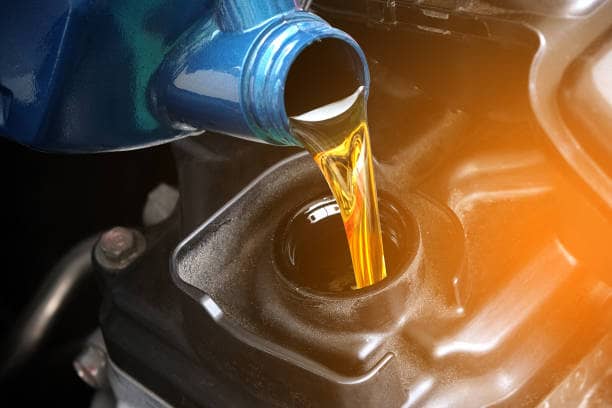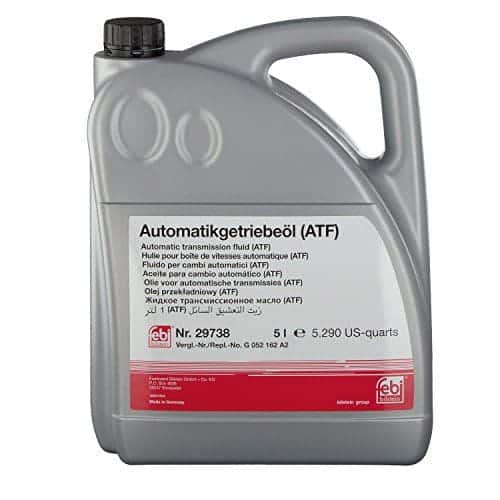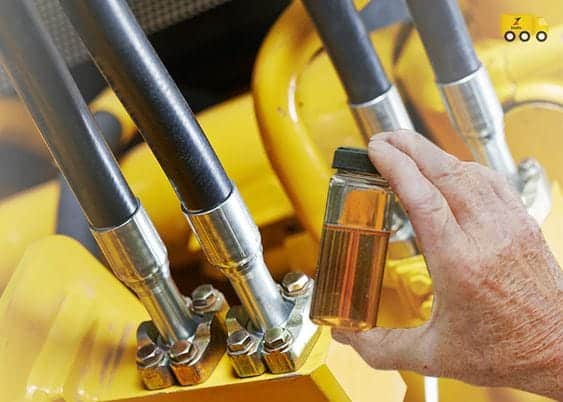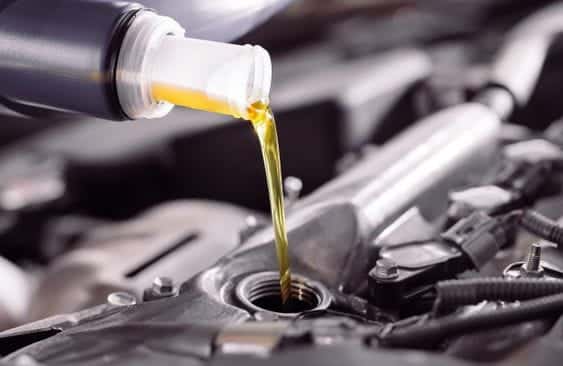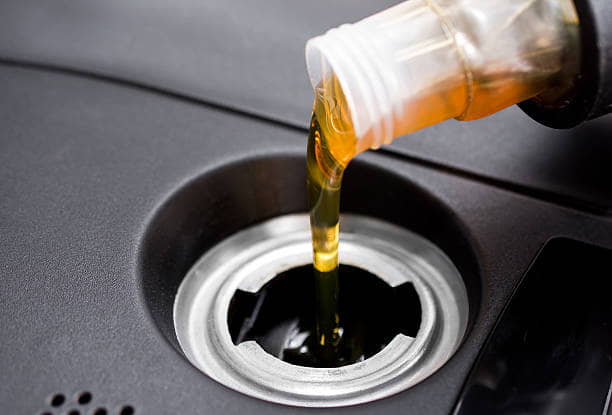Like vehicles and many other machines, air compressors must be oiled to operate efficiently and reach their peak capacity.
Of course, you can’t use the oil that you use in your car for your compressors. Air compressor oils are the ideal choice as they are designed for this purpose.
However, you can’t always find those products. There will be times when you have to consider using an air compressor oil substitute.
Candidates for the Air Compressor Oil Substitute
Automatic Transmission Fluid (ATF)
ATF is the most popular alternative to air compressors. As a hydraulic fluid type, it features many properties that you can find in compressor oils.
Many homeowners and users often store some of this transmission fluid in their garage, making it a convenient backup selection in emergencies.
However, this option also has some disadvantages worth considering.
ATF Pros And Cons
Pros
- Protect against corrosion.
- Help prevent overheating.
- Typically more convenient than other alternatives.
- Easy to find, available at most auto parts stores.
Cons
- May void warranty if used.
- Low viscosity can cause internal leaks.
- It might include detergents that negatively affect the compressor.
Viscosity
The viscosity option is typically significantly lower than typical compressor oils.
It may be helpful for startup capability at cold temperatures. But it cannot deliver adequate lubrication during operation and even cause internal leaks since the thinner fluid gets past the seals on the piston.
Automatic transmission fluid may be effective in emergencies. But because of the above reasons, it may be the last resort for many users.
Additives
ATF usually contains additives that can prevent oxidation and corrosion, helping extend the lifespan of compressors.
But in most cases, ATFs include detergents that lead to grit and carbon buildup inside the machine’s pump, causing premature wear.
As a result, ATFs are the least reasonable option of all the alternatives, especially for long-run use.
Hydraulic Oil (HO)
HO is another possible substitute for compressor oils. It should fall under the hydraulic fluid category, but the distinction concerns the composition and how to use it.
This option serves many functions similar to compressor oil, such as cooling, oxidation/corrosion control, and lubrication.
Hydraulic Oil Pros and Cons
Pros
- Most kinds protect against corrosion/rust.
- Available in most automotive stores and hardware.
- Provide lubrication and cool for machines’ internal components.
Cons
- May void the warranty if used.
- Less is available than other options.
- Fairly more expensive than other alternatives.
- Not suitable for larger machines (20-gallon or more).
Type
It is not wise to use all the fluid you have around. For example, the power and brake fluids will not work and even damage the compressor pumps.
You should opt for universal basic hydraulic oils labeled “for utilizing in any hydraulic system.” You can typically find them at auto parts stores and hardware.
Some products are labeled as “anti-wear” or AW as they include additives against oxidation, corrosion, and damaging forces. It is okay if this product doesn’t have any detergents.
Viscosity
Its viscosity is counted by the ISO scale rather than the SAE one, but they are quite similar.
In most cases, HOs are ISO 46 or ISO 32. The more the rating increased, the thicker the oils.
As most compressors use SAE 30 oils, the ISO 32 product is an excellent way to go, especially if you live in cold environments.
It will also work fine at moderate temperature. Generally, you should stay near the normal compressor oil rating.
Non-Detergent Motor Oil
It is feasible to use motor oils to replace compressor oils, but they need to meet some essential criteria to avoid damage to the compressor pump.
Non-Detergent Motor Oil Pros And Cons
Pros
- Relatively inexpensive.
- Help prevent overheating.
- It can be found in most automotive stores and hardware.
- Provide lubrication for internal pump components.
- Many manufacturers accept it as one acceptable temporary alternative.
Cons
- Less common.
- It is limited by the kind of oil.
- May void warranty if utilized.
Non-Detergent And Bust?
Motor oils are often not an ideal alternative to compressor oils as they typically contain detergents that can damage the motor.
You can find motor oils labeled as ND or “non-detergent,” which is not easy.
Oil Viscosity
One of the other essential things that you need to take care of is viscosity.
In most cases, compressors use SAE 30 or SAE 20 oil. The former works well for the warmer temperature, and the other is ideal for the colder temperature.
We recommend using the oil viscosity closest to the original compressor oil, which you can find in your owner’s manual.
Sometimes, the manual even mentions acceptable motor oil substitutes.
If your manual doesn’t specifically recommend it, you should avoid utilizing multi-viscosity oils (like 10W30) since they can foam up when utilized in a compressor.
Synthetic And Mineral
You should use synthetic oils as they work best at various temperatures, creating less buildup inside your pump and last longer than their mineral-based counterparts.
That said, it will not make a significant difference if you only use it in the short term (recommended).
Things to Consider When Utilizing Compressor Oil Substitutes
We have suggested three reasonable options for air compressor oil substitutes. Here are a few things you need to consider before using them.
Warranty
It is the main reason preventing you from using any substitute.
Most manufacturers state that the warranty might be void if you utilize something other than the lubricant they recommend, which you can find in your owner’s manual.
So if your machine is under warranty, we recommend utilizing the oil suggested by the manufacturer and commonly referred to in your owner’s manual and guidebook.
Mixing Lubricants
Never mix different kinds of oil. If you must add more oil to a compressor, ensure you use what is already inside it.
If you want to use another substitute, drain the remaining oil and flush your system before adding the new substitute.
Why Is It Important To Change Compressor Oil Regularly?
We need to change the oils of our cars’ engines periodically, and the same goes for compressors.
When the pump of compressors runs, the oil will be sprinkled onto the crankshaft and piston. Small amounts of carbon, dirt, and grit will gradually accumulate in the normally used oil.
The oils also break down due to friction and heat, and additives (such as demulsifiers and anti-rust agents) in oils will be less effective over time.
As a result, oils will be sludge and thicker, making them no longer provide good lubrication and might deposit grit on mechanical parts.
It can cause excessive friction and overheat, which can strain your pump motor, then cause it to wear out and get damaged faster.
FAQs
What Kind Of Oil Should I Use In My Air Compressor?
If your machine is under warranty, we recommend utilizing the oil suggested by the manufacturer and commonly referred to in the owner’s manual/guidebook.
The owner’s manual will often suggest products that work best for your machine and ensure it reaches peak performance.
It is always wise to obey the warranty guidelines of the manufacturer. Utilizing non-specified substitutes could eliminate added perks and void the warranty.
If you can’t find the recommended oils in the owner’s manual, you should utilize standard compressor oils (from 20 or 30 weights).
Using motor oils or synthetics as substitutes is alright, but you need to ensure your motor oils do not contain detergents, which can produce carbon buildup in compressors.
Synthetics And Standard Compressor Oils: Which Is Better?
| Duty Cycle Rating | Synthetics | Mineral Oils |
|---|---|---|
| Light Duty And Infrequent Use | Okay | Best |
| Heavy Duty And Continuous Use | Best | Okay |
Do All Compressors Need Oil?
Not all compressors need oil. You just need to add oil to your machine’s engine if your compressor is an oil-lubricated model.
Oil-free air compressors don’t require oil as they’re already coated and sealed by factories.
The fact is that oil-less machines do not last as long as their Lubricated counterparts.
Changing the oil in your lubricated machine as often as it is for your car is unnecessary. Instead, we recommend changing it once each year.
Where Can I Find Compressor Oils?
You can find these oils in most automotive stores and hardware or on Amazon.
Wrapping It Up
A great rule of thumb is to avoid substitutes whenever you can. So you should only utilize substitutes when air compressor oils are not available. There is no guarantee that your chosen alternatives will work great with your machine.
You can also use compressor oil substitutes which we mentioned in this post. Just follow our instructions, and you will be fine.
Thanks for stopping!

